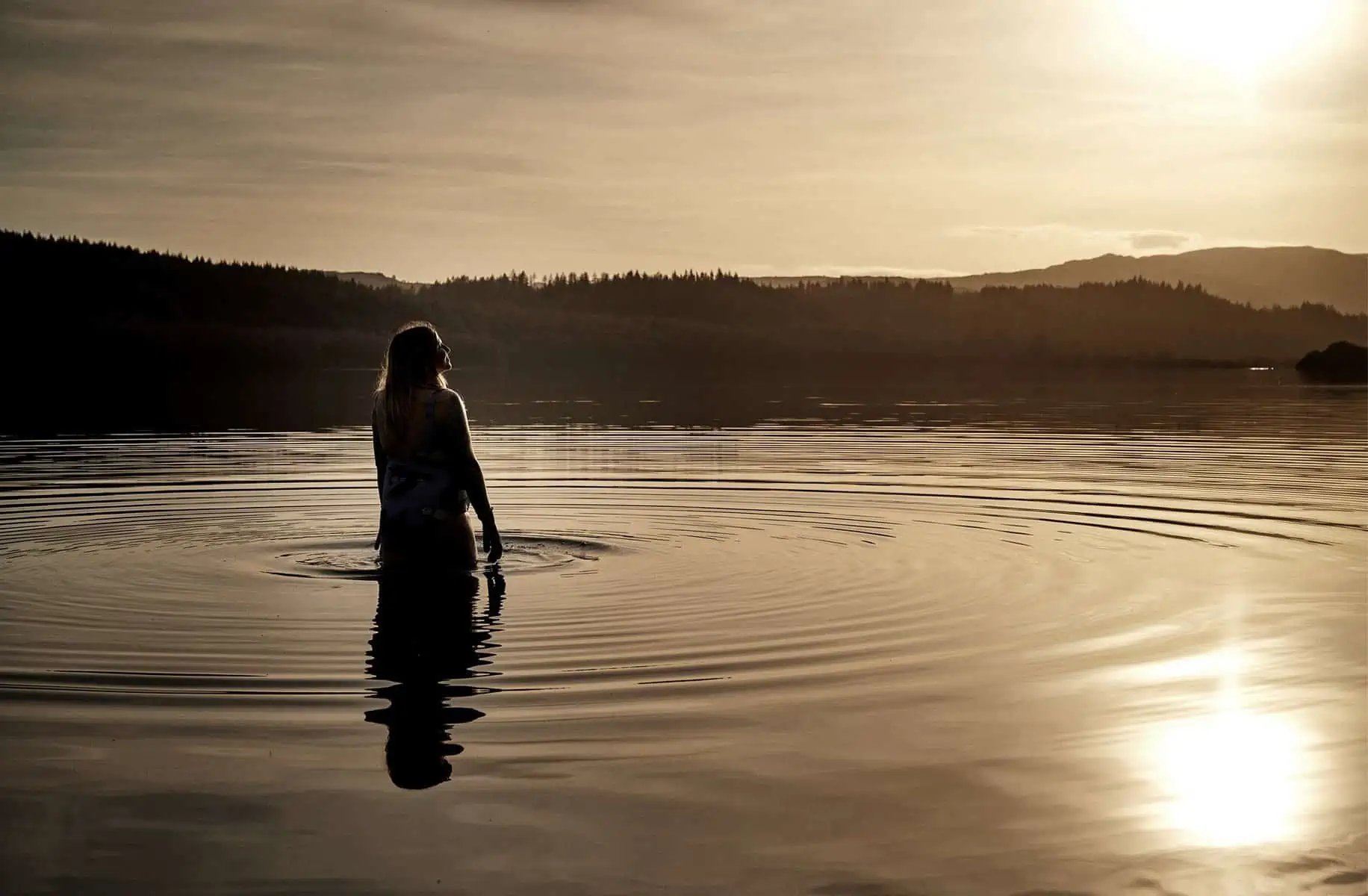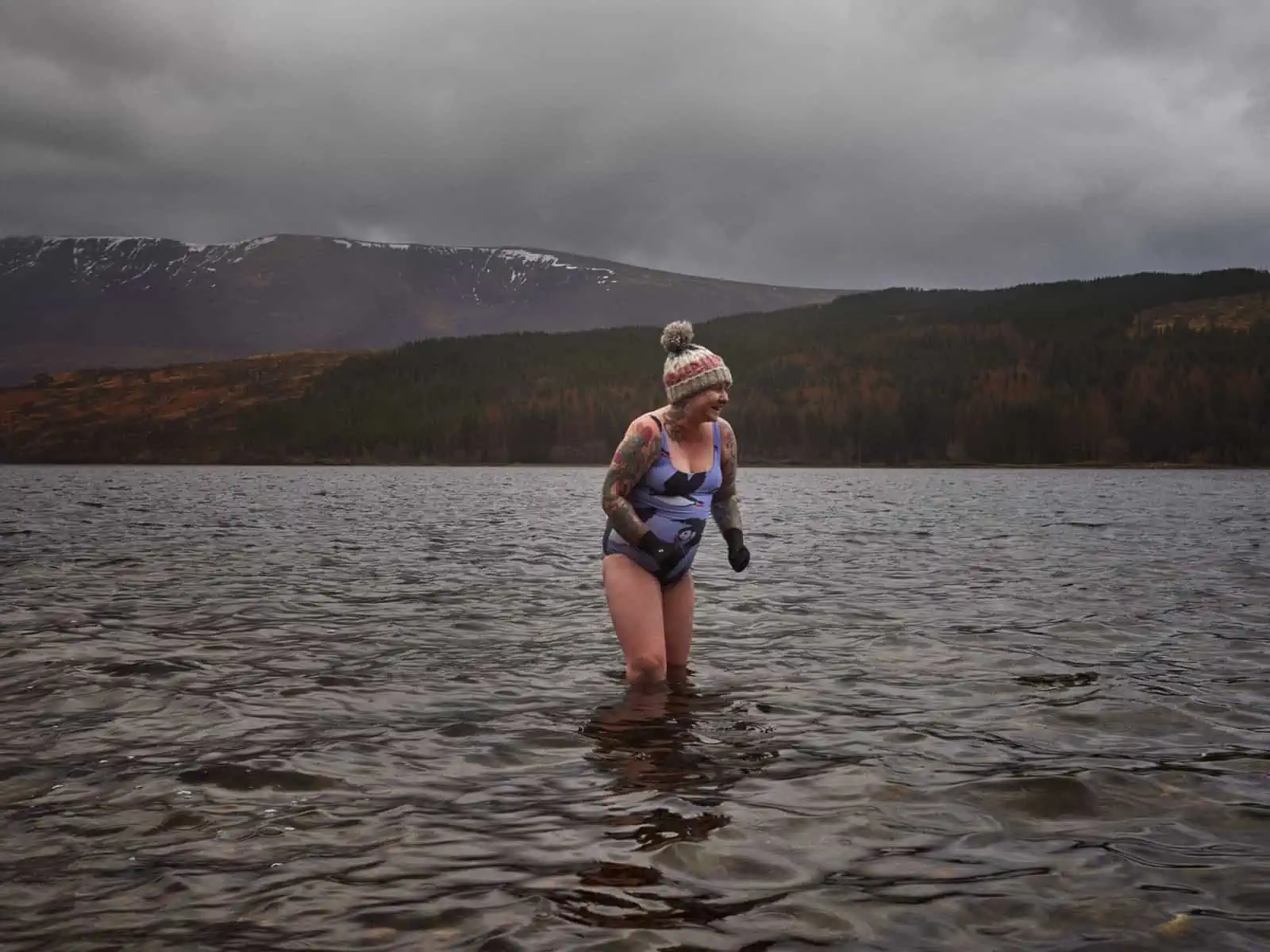It’s a crisp winter’s day on the shores of a pristine lake in the Lake District, UK. Haze and condensation from the water rises as the sun starts to shine on the water’s surface. After a winter of swimming in cold and ice water, and the week past, in the lochs of the Scottish Highlands, Fay Doyle emerges from their last swim of the trip with a sense of clarity and realisation. Below, Fay outlines what wild swimming through the winter has taught them about themselves and how it has helped them to view themselves differently.
When I started wild swimming about a year ago, I wasn’t sure if I was going to be someone who swam all through the winter, but the winter came, and I didn’t stop. I couldn’t. Little did I realise just how much I’d come to love the ritual of the cold water and the way it would make me feel. As the winter was ending, I had the opportunity to visit the Scottish Highlands where I was eager to swim as much as possible. I’d come to love the feeling of the cold on my skin so much and the transformation it would often allow for my mood, that I went armed with a long list of lochs I wanted to experience. Come rain or shine, I was committed. Even if each dip was just a few seconds, it felt better than no dip. There were swims within that week that felt liberating, there were some that felt unimaginably hard. However, each single one helped me feel more confident and surer of myself in the cold water. It also taught me a lot about myself – here’s what I learnt:
Are you a new wild swimmer? Our guide gives some top equipment recommendations and tips to help you get the most out of your time in cold water.
My body is capable of a lot more than I give it credit for
I think we are so harsh on our bodies a lot of the time – I feel like I’m in a constant war with my body that never seems to get me anywhere other than loathing the way it looks. The act of swimming in cold and ice water through the winter allowed me to frame and see my body in a different way. The fact that I could go through this set of rituals to get myself in the water felt like a miracle. The idea that within a few seconds of having acclimatised to the water, I was swimming, felt like a masterpiece that needed to be celebrated. My body can do tough things and some of what we tell ourselves we can’t do is based on the context of who we are and what we’ve experienced beforehand.
Image description: A landscape image. Fay stands to the left of the frame with ripples of water around them. Fay is in shadow as the sunlight toward the end of the day causing a sunset casts light and shadow on them. The light is golden.
Taking small consistent action adds up
It’s very rare that we have these microcosmic realisations and see how far we’ve come. Swimming through the winter did that for me and it worked to symbolise how effective a method it can be to break things down, turn them into a habit and keeping on going when things get tough. It reminded me so much of the resilience that I have had to call on so many times in my life. I think when we first get into things is one of the easiest times for us to lose momentum. We want to be good at something straight away, and when we’re not, we often stop. When I first started swimming in the colder months this last year, I could stay in the water for a few seconds at a time. My time in Scotland in March saw me really step things up. I had the opportunity to swim every single day and many of those opportunities, it was raining, windy and incredibly cold. By the end of that trip, I was able to summarise everything that had led up to that with a swim in the Lake District on my way home. It felt so much different. I felt strong. The water felt warm. That really cemented for me that enjoying the journey, with consistency is really what wins the race.
Our gear for cold water swimming guide is a great place to learn about the equipment essentials you’ll need to swim through the colder months along with some top tips on how ensure your swims are fun and safe
Mindfulness is magical and connective
Some swim days in the winter, where you’re stood on the shore looking at the water and sky blending into one with gusts of wind chilling you to the core are the hardest. The moment before you get in, even harder. Every single part of you, to the core is telling you not to get into the water. I’m fairly convinced I’ve felt something magnetic in me pulling me back to the shore at times. However, there is something that feels so strong about keeping with that very moment and moving your body forward in a way that feels quite unnatural. It is the absolute moment of mindfulness. As you enter the water, hurried breathing takes over and every moment of pushing the body beneath the water feels like a new kind of torture. Then there’s the setting off – the water feeling like prickles brushing against the skin. These dips, I realised were making me feel more present, more in tune with myself and my surroundings. I had to be. That has felt somewhat magical and when I think of this winter, it feels a lot softer and less harsh than winters previous. Getting in the water makes me feel good. Like uncontrollable grin kind of good, and I think we need more of those kinds of things in our lives that just make us feel good.
Image description: A landscape image. Fay stands in the centre of the image, and is in dark water. Fay is bright red having just finished a swim and has a smile on their face. Fay wears black neoprene gloves, a bobble hat and purple swimsuit. Behind them are mountains topped with snow.
Related content: 22 Places for Wild Swimming in the UK
Trust the process
In order to swim, you need to trust yourself and what your body is capable of. In order to swim in really cold water, I think you really must trust in yourself even more. You also have to trust yourself that you know your limits. It isn’t just that though. For me, it’s been about the idea of trusting that when I’m stood on the shore wondering why on earth I’m about to do this, that I will feel better than I did at the start. It’s about trusting whatever comes up when I’m swimming and whatever emotion comes to the surface, has come up for a reason. It’s about trusting my body will warm up again. For someone with anxiety, this has been huge, and it has really let me trust in the process in so many other areas of my life, too.



